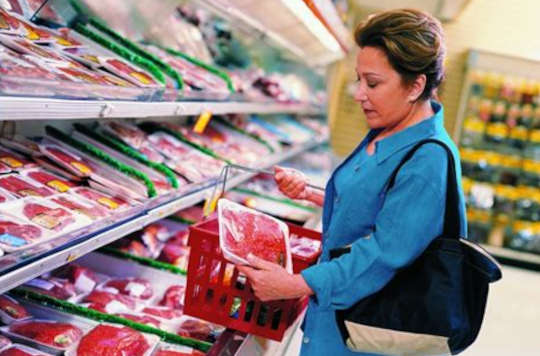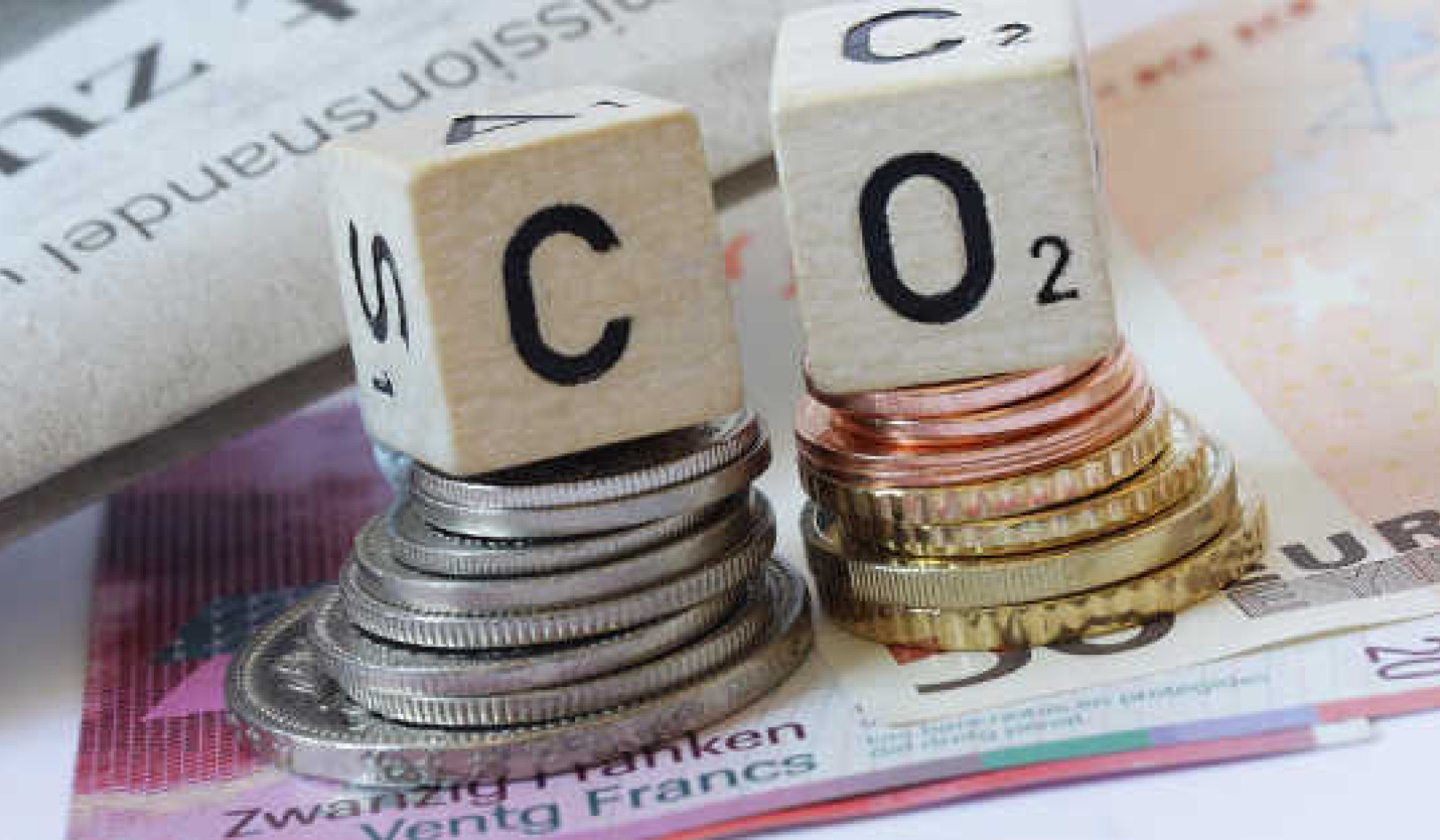
"Climate-labeling clearly affects consumers—both those people who are keen to be aware of the climate impact, as well as those who actively seek to ignore this sort of knowledge," says Jonas Nordström.
Climate labels about a meat product’s carbon footprint cause many people to choose a climate-friendlier option, research suggests.
The finding, based on hypothetical purchasing decisions among Swedish consumers, applied to both people who were curious about a product’s carbon footprint and those who actively avoided wanting to know more.
As such, climate labeling food products can be a good way of reducing our climate footprint. But the labels must be obligatory for them to be effective, says Jonas Nordström, associate professor in the University of Copenhagen’s food and resource economics department.
Certain situations exist in which we humans strategically avoid greater knowledge and more information—a phenomenon known as “active information avoidance.” It could be that we don’t want to know how many calories are in the bag of chips that we’ve just opened. Or, that we avoid going to the doctor because we fear a certain diagnosis.
“Our experiments demonstrate that one out of three people doesn’t want to know the climate impact of the food they eat. But at the same time, we can see that there is a psychological effect when people are informed on its climate impact, in so far as more people end up buying a less CO2 heavy product,” says Nordström.
In the experiment, 803 participants had to choose between six alternatives consisting of variations of ground meat and a plant-based mixture, each without a climate label. The participants were then asked whether or not they wanted to know the climate information for the products. Of the participants, 33% said no. All of them were then asked to make new choices, where the products now had a label with their CO2 information.
For those who said yes to the information, there was a 32% reduction in the climate footprint through their new product choices, while the “information avoiders” collectively reduced their footprint by 12% after exposure to the climate labeling.
The researchers believe that a portion of the information avoiders actively chose to opt out of more information as a way of remaining unknowledgeable—for example to avoid any inner conflict between what they want to do and what they ought to do.
“Our assumption is that being aware of a product’s climate impact has a psychological cost for the consumer. If someone who enjoys red meat is informed of its climate impact, it may prompt them to feel a bit of shame or have a guilty conscience. By actively opting out of this information, it becomes less uncomfortable to make a choice that would be seen as a climate sin,” explains Nordström.
“However, if information about the climate impact is forced upon the consumer, some will opt to buy chicken instead of beef, and in so doing, mitigate some of the negative feelings associated with making a decision that has a greater climate consequence. In our experiment, this resulted in a 12% lower carbon footprint.”
While some Danish supermarkets have begun to inform consumers about the climate effects of their purchasing decisions, there are few products with labeled CO2 footprint information. The researchers believe that the study’s results can be used as an argument for implementing obligatory climate information on foodstuffs.
“Climate-labeling clearly affects consumers—both those people who are keen to be aware of the climate impact, as well as those who actively seek to ignore this sort of knowledge. The study demonstrates that the latter group can only be affected if they are provided with the information. For climate labeling to be effective, it needs to be obligatory as certain producers of climate threatening products won’t voluntarily provide their products with this type of information,” says Nordström.
He adds that the effect could be even greater if there is a simultaneous drive towards informing the public that everyone’s contribution is important when it comes to achieving climate goals.
About the Authors
Coauthors of the study, published in the journal Food Policy, are from the Swedish University of Agricultural Sciences. Original Study
Related Books
Drawdown: The Most Comprehensive Plan Ever Proposed to Reverse Global Warming
by Paul Hawken and Tom Steyer In the face of widespread fear and apathy, an international coalition of researchers, professionals, and scientists have come together to offer a set of realistic and bold solutions to climate change. One hundred techniques and practices are described here—some are well known; some you may have never heard of. They range from clean energy to educating girls in lower-income countries to land use practices that pull carbon out of the air. The solutions exist, are economically viable, and communities throughout the world are currently enacting them with skill and determination. Available On Amazon
In the face of widespread fear and apathy, an international coalition of researchers, professionals, and scientists have come together to offer a set of realistic and bold solutions to climate change. One hundred techniques and practices are described here—some are well known; some you may have never heard of. They range from clean energy to educating girls in lower-income countries to land use practices that pull carbon out of the air. The solutions exist, are economically viable, and communities throughout the world are currently enacting them with skill and determination. Available On Amazon
Designing Climate Solutions: A Policy Guide for Low-Carbon Energy
by Hal Harvey, Robbie Orvis, Jeffrey Rissman With the effects of climate change already upon us, the need to cut global greenhouse gas emissions is nothing less than urgent. It’s a daunting challenge, but the technologies and strategies to meet it exist today. A small set of energy policies, designed and implemented well, can put us on the path to a low carbon future. Energy systems are large and complex, so energy policy must be focused and cost-effective. One-size-fits-all approaches simply won’t get the job done. Policymakers need a clear, comprehensive resource that outlines the energy policies that will have the biggest impact on our climate future, and describes how to design these policies well. Available On Amazon
With the effects of climate change already upon us, the need to cut global greenhouse gas emissions is nothing less than urgent. It’s a daunting challenge, but the technologies and strategies to meet it exist today. A small set of energy policies, designed and implemented well, can put us on the path to a low carbon future. Energy systems are large and complex, so energy policy must be focused and cost-effective. One-size-fits-all approaches simply won’t get the job done. Policymakers need a clear, comprehensive resource that outlines the energy policies that will have the biggest impact on our climate future, and describes how to design these policies well. Available On Amazon
This Changes Everything: Capitalism vs. The Climate
by Naomi Klein In This Changes Everything Naomi Klein argues that climate change isn’t just another issue to be neatly filed between taxes and health care. It’s an alarm that calls us to fix an economic system that is already failing us in many ways. Klein meticulously builds the case for how massively reducing our greenhouse emissions is our best chance to simultaneously reduce gaping inequalities, re-imagine our broken democracies, and rebuild our gutted local economies. She exposes the ideological desperation of the climate-change deniers, the messianic delusions of the would-be geoengineers, and the tragic defeatism of too many mainstream green initiatives. And she demonstrates precisely why the market has not—and cannot—fix the climate crisis but will instead make things worse, with ever more extreme and ecologically damaging extraction methods, accompanied by rampant disaster capitalism. Available On Amazon
In This Changes Everything Naomi Klein argues that climate change isn’t just another issue to be neatly filed between taxes and health care. It’s an alarm that calls us to fix an economic system that is already failing us in many ways. Klein meticulously builds the case for how massively reducing our greenhouse emissions is our best chance to simultaneously reduce gaping inequalities, re-imagine our broken democracies, and rebuild our gutted local economies. She exposes the ideological desperation of the climate-change deniers, the messianic delusions of the would-be geoengineers, and the tragic defeatism of too many mainstream green initiatives. And she demonstrates precisely why the market has not—and cannot—fix the climate crisis but will instead make things worse, with ever more extreme and ecologically damaging extraction methods, accompanied by rampant disaster capitalism. Available On Amazon
From The Publisher:
Purchases on Amazon go to defray the cost of bringing you InnerSelf.comelf.com, MightyNatural.com, and ClimateImpactNews.com at no cost and without advertisers that track your browsing habits. Even if you click on a link but don't buy these selected products, anything else you buy in that same visit on Amazon pays us a small commission. There is no additional cost to you, so please contribute to the effort. You can also use this link to use to Amazon at any time so you can help support our efforts.























